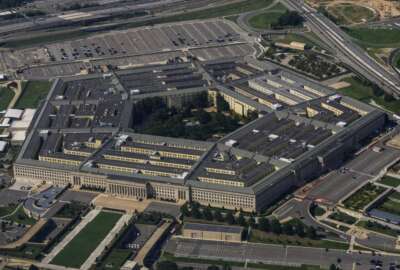Senate Approps passes defense bill, blowing past budget caps
Senate appropriators recommending a 3.3% increase in defense spending signals that the bipartisan agreement on spending caps might be falling apart.
The Senate Appropriations Committee on Thursday approved its fiscal 2025 defense spending bill, funding the Defense Department at $852.2 billion, a 3.3% increase over fiscal 2024.
The bipartisan bill, approved unanimously, still has to be reconciled with the House’s version of the Pentagon funding legislation, which authorized $833 billion in total funding — a 1% increase over fiscal 2024.
Senate appropriators moving forward with a 3.3% increase signals that the bipartisan agreement on spending caps, which limits discretionary spending to 1% for defense and non-defense programs, might be falling apart.
The Senate Appropriations Committee’s decision to boost funds for defense spending beyond 1% will open up a budget fight with the House, which has adhered to the spending limits set by the 2023 Fiscal Responsibility Act.
Higher defense spending could also result in higher spending on domestic programs, as Democrats, including Sen. Patty Murray (D-WA), have argued that any increase in the defense budget should be matched by an increase on domestic spending.
“The 1% increase in funding provided for fiscal 2025 under the caps is as inadequate for non-defense spending as it is for the Department of Defense. We all know this very clearly. As members talk about how we might increase investments to better meet our defense needs, we cannot ignore our needs here at home as well. When it comes to additional resources above the caps, I’m going to insist on parity for non-defense spending,” Murray said during a budget hearing in May.
The mark-up meeting follows the Senate Armed Services Committee’s hearing on the 2022 National Defense Strategy. A congressionally mandated bipartisan commission recommended that Congress revoke the 2023 Fiscal Responsibility Act spending caps and endorsed an up to 5% increase in defense spending.
“I appreciate the commission’s recommendation that national security spending must return to late Cold War level — a goal which matches my plan to spend 5%, eventually, of GDP on defense. That level of investment would be temporary. It would be a downpayment on the rebuilding of our national defense tools,”” Sen. Roger Wicker (R-Miss.) said during the Senate Armed Services Committee hearing on Tuesday.
The Senate appropriators’ bill is now moving to the Senate floor for consideration, but lawmakers won’t take it up until they are back in town from a month-long summer recess.
The spending bill includes a 5.5% raise for junior enlisted personnel in the E-1 through E-3 ranks and a 4.5% raise for all other service members. The Senate Armed Services Committee also endorsed a 4.5% pay bump in its defense policy bill released last month, which puts the Senate and the House at odds as the House wants to provide a 19.5% pay increase for junior enlisted service members.
In addition, the bill fulfills the Army’s number one unfunded priority for 1,200 counter-drone systems and radars, providing about $1 billion for counter-drone capabilities.
Senate Appropriators added over $1 billion to address “classified Space Force unfunded requirements identified by the Chief of Space Operations, including for space control capabilities, nuclear electric propulsion and commercial sensing.” In March, the Space Force and the Space Command’s wish list totaled $2.3 billion in unfunded requirements.
The bill also includes $500 million above the budget request for Defense Production Act investments in the defense industrial base, including microelectronics, critical chemicals and hypersonics.
Since lawmakers are on recess until Sept. 9, Congress will most likely need a short-term spending bill to avert a government shutdown. Lawmakers wrapped up last year’s defense budget in March, nearly six months into the budget year.
“I want to remind everybody that last year’s budget was done six months late. As a result of that, our sailors, soldiers, airmen, Marines and space guardians were fighting literally with one hand tied behind their back. How do we hold defense contractors accountable when we don’t do our job? We have got to get our budgets done on time,” Sen. Jon Tester said during Thursday’s mark-up hearing.
Copyright © 2025 Federal News Network. All rights reserved. This website is not intended for users located within the European Economic Area.







